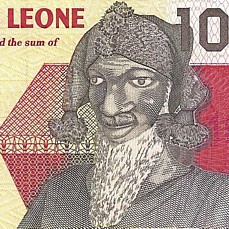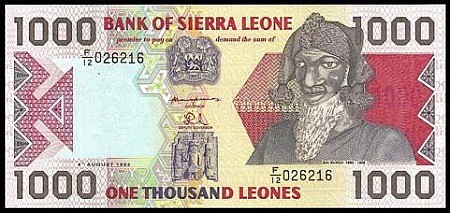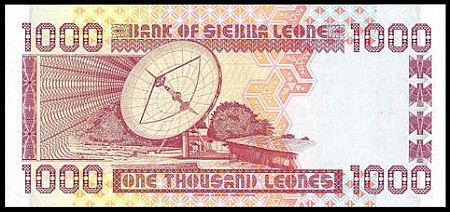SIERRA LEONE
Bai Bureh

Sierra Leone was an important center of the slave trade until Freetown was founded in 1787 by the Sierra Leone Company, an organization that established the first ex-slave colony in Africa. In 1808, Freetown became a British Crown Colony.
Then, in 1840, Bai Bureh was born in a town called Kaseh near Port Loko in Northern Sierra Leone. Bureh was sent at a young age to Gbendembu, a small village in northern Sierra Leone, where he was trained to become a warrior like his father, a warrior chief of the Loko tribe in Sierra Leone. During his training he showed that he was a formidable warrior and was given the nickname of Kebalai which translates as ‘one who doesn’t tire of war’. After his training, he was himself a warrior chief between 1860 and 1870 winning several battles with neighboring tribes against their improper Islamic practices. He fought against the Susu people from French Guinea who invaded Kambia, a town in northern Sierra Leone. His victory against the Susu earned him the respect of many tribes and by 1886 he was made the Chief of the Northern Province in Sierra Leone. It was at this time he earned the Title Bai, meaning Leader.
Bureh’s independent leadership quickly annoyed the British rulers in Freetown. He even refused to acknowledge a peace treaty the British brokered with the Limba tribe, who were then shirking all the influence and advances in western education, simply because he was not a part of the treaty.
On January 1st, 1898, the British colonials instituted a ‘Hut Tax’. This tax was issued throughout British controlled Africa and was a tax for each hut or household. The tax could be paid in either money, grain, stock or labor. Many African families had to send persons to work as laborers to pay the tax. The Hut Tax due on huts with 4 rooms or more was 10 shillings, and huts with less than 4 rooms had to pay five shillings. The Hut Tax enabled the British to build roads, towns, railways and other infrastructure amenities.
Sierra Leone was a Crown Colony and under British Rule, but there were two areas within Sierra Leone allowed to be protectorates of the British: The Shenge Kingdom, declared a protectorate in 1861, and the Koya-Tenme Kingdom, declared a protectorate in 1896. The British were worried that Bai Bureh would resist the new ‘Hut Tax’ and lead his people in revolt, so when they declared the kingdom of Koya Temne their protectorate, a warrant for Bai Bureh’s arrest was issued. This was a costly mistake for the British, and led to the Hut Tax War of 1898, led by Bai Bureh.
Bureh was a well respected leader and his people rallied around him. He was able to evade the British and with a large contingent of warriors on his side, he led a guerilla war against the British colonials for ten months. For the first four months his forces managed to hold the upper hand against the British. Bureh’s men would ambush the British troops and fire at them from camouflaged fences made of logs tied with vines and supported by boulders. Bai Bureh gained a reputation for magical powers enabling him to become invisible to his enemies, remain bullet proof, and for being able to stay under water for extended periods of time. Bureh’s tactics were a precursor to the guerilla tactics used even today.
At one point, the British offered a reward of 100 British Pounds for his capture. Bureh then offered a reward of 500 pounds for the capture of the Governor, Sir Frederic Cardew. But as was often the case, the British Forces were able to outlast the rebellion and Bai Bureh was captured in November 1898 by the new West African Regiment under Sir Edward Woodgate’s command. When he was captured, he is reported to have said “De war done-done”. Bai Bureh was sent to Freetown and jailed. During his time in Freetown throngs of persons would flock to catch sight of the rebel hero. Bai Bureh was then exiled to Ghana until 1905 when he returned to Sierra Leone and resumed his position of a Chief of Kasseh in northern Sierra Leone. Bai Bureh remained in Kaseh until he died in 1908.

